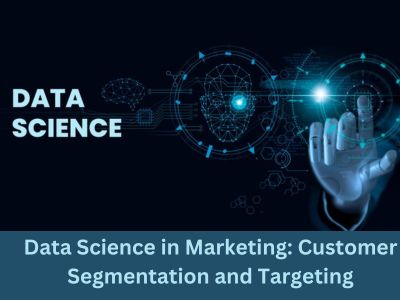
In today’s digital age, the world of marketing is undergoing a profound transformation, thanks to the influence of data science. One of the key areas where data science has made a significant impact is customer segmentation and targeting. This strategic approach leverages the power of data to divide a broader customer base into specific, homogeneous groups, enabling marketers to create highly tailored and effective campaigns.
The Power of Customer Segmentation
Customer segmentation is the process of categorizing a brand’s audience into distinct groups based on shared characteristics such as demographics, behavior, preferences, and purchasing history. This allows marketers to understand their customers on a granular level, which, in turn, informs personalized marketing strategies. Here’s why customer segmentation is so vital:
Personalization: When a brand knows its customers well, it can create marketing messages, offers, and content that are highly relevant to each segment. This level of personalization significantly enhances the customer experience and fosters brand loyalty.
Efficiency: Rather than employing a one-size-fits-all marketing approach, segmentation ensures that marketing efforts are focused and efficient. This results in better conversion rates and a more cost-effective strategy.
Improved Product Development: Customer segmentation helps businesses tailor their products and services to meet the specific needs and desires of each customer group. It encourages innovation and product development that aligns with customer preferences.
Data-Driven Decision-Making: Through data science, segmentation enables data-driven decision-making. This ensures that marketing strategies are based on real customer insights rather than assumptions.
The Role of Data Science
Data science is the driving force behind effective customer segmentation and targeting. It involves the collection and analysis of vast amounts of data to identify patterns, correlations, and customer behavior. Here’s how data science contributes to marketing success:
Data Collection: Data scientists gather data from various sources, including customer databases, website interactions, social media, and more. This data encompasses both structured and unstructured information, providing a comprehensive view of customer behavior.
Data Analysis: Through statistical analysis and machine learning techniques, data scientists identify meaningful segments within the customer base. This analysis is based on a multitude of factors, from purchasing history to online behavior.
Predictive Modeling: Data science enables predictive modeling, which helps marketers anticipate future customer behavior. For example, predictive models can forecast which customers are likely to churn or identify those who may be interested in a new product.
Recommendation Engines: Data science powers recommendation engines, as seen on platforms like Amazon and Netflix. These engines analyze a customer’s past behavior to suggest products or content they are likely to enjoy, thus driving additional sales and engagement.
A/B Testing: Marketers often use A/B testing to compare different marketing strategies. Data science helps design these tests, gather data, and draw insights to refine and optimize marketing efforts continually.
Challenges and Ethical Considerations
While data science brings many benefits to marketing, it also raises challenges, including data privacy and ethical considerations. It is crucial to handle customer data responsibly, ensuring its security and privacy. This is especially important in an era of increasing concerns about data breaches and privacy violations.
Moreover, marketers must be aware of the ethical implications of data collection and usage. It’s vital to strike a balance between personalization and intrusion, ensuring that marketing strategies are respectful and non-invasive.
The Future of Data Science in Marketing
As technology continues to advance, data science in marketing will become even more sophisticated. Artificial intelligence and machine learning will play increasingly significant roles, enabling real-time personalization, more accurate predictions, and improved customer experiences.
Conclusion
Data science has ushered in a new era of marketing, where customer segmentation and targeting are more precise and effective than ever before. With data-driven insights, businesses can create personalized marketing strategies that enhance the customer experience and drive better results. However, it is essential to wield this power responsibly, ensuring data privacy and ethical practices. The future of data science in marketing promises continued growth and innovation, making it an exciting and evolving field within the world of marketing. Explore the opportunities in the best data science course in Varanasi, Ahmedabad, Noida and all locations in India to be a part of this dynamic field.




